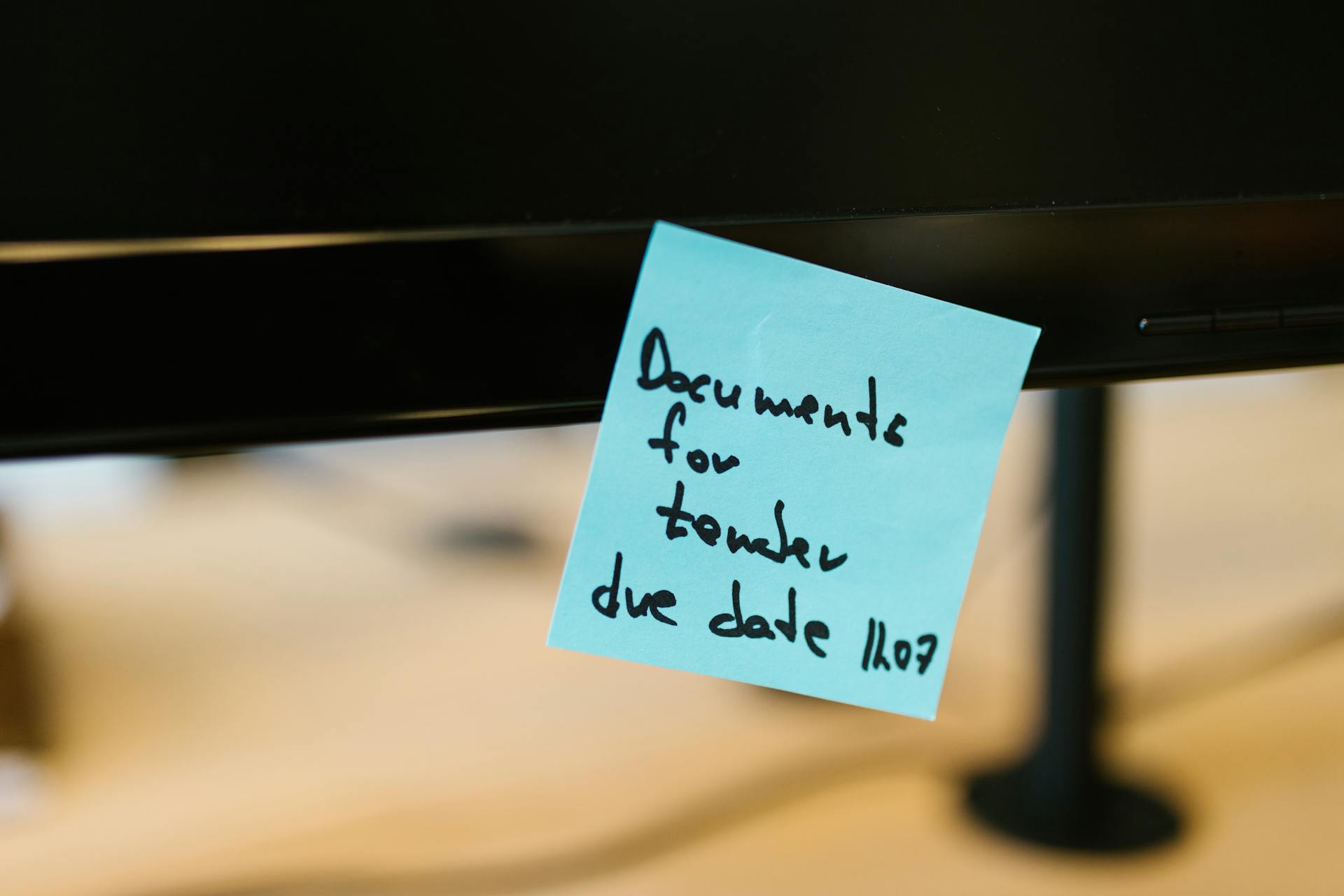
Being behind on credit card payments can be a stressful and overwhelming experience.
If you're struggling to make payments, you're not alone - over 40% of Americans have missed a credit card payment at some point.
Missing a payment can lead to a significant increase in interest rates, up to 29.99% or more.
This can quickly add up and make it even harder to get back on track.
According to the Fair Credit Reporting Act, credit card companies can report late payments to the credit bureaus, which can negatively impact your credit score.
A single late payment can drop your credit score by up to 100 points.
It's essential to communicate with your credit card company as soon as possible to avoid further penalties and fees.
Understanding Credit Card Delinquency
Credit card delinquency is a serious issue that can have far-reaching consequences on your credit score and financial stability. If you're behind on credit card payments, it's essential to catch up as fast as possible to avoid further damage.
A delinquent credit card payment is considered late by 30 days or more, which can result in late fees and negatively impact your credit report. If left unpaid, delinquency can even lead to credit card suspension, account closure, and eventually the account being charged off.
Your payment history typically makes up 35% of your credit score, so delinquency due to late payments can have a significant negative impact on your credit score. Late payments, delinquencies, or other derogatory activity can also adversely impact your ability to build or rebuild credit.
A charge off is one of the final stages of credit card delinquency, typically occurring after about six to seven months without acceptable payments. This can be devastating to your credit score, but it's essential to remember that you may have options to fix this problem and lessen the impact.
If you're struggling to make payments, contact your credit card company to explore payment options. You can also consider building credit with responsible use, such as with a secured credit card that reports to the three major credit bureaus.
Consequences of Missing Payments
Missing credit card payments can have serious consequences. You could face a range of penalties that can affect your finances.
If you don't make the minimum payment by the due date, a late fee will be added to your balance, increasing what you owe. This can lead to a cycle of debt that's hard to get out of.
Missing payments can trigger higher interest rates, damaging your credit score and appearing as missed payments on your credit report. This can make it harder to get credit in the future.
You may also lose your promotional APR, which can save you hundreds of dollars in interest. If you miss a payment, the issuer may vacate your 0 percent APR and begin applying the regular interest rate to your balance.
Failing to make the minimum payment can lead to account closure, which will lower your credit score because you'll have less credit available. You'll still have to make regular payments and pay off the balance.
A penalty APR can also be imposed, which can be as high as 29.99 percent. This can remain indefinitely if you continue to miss payments and violate your card's terms.
Suggestion: Will Debt Collectors Sue You in Sc
Managing Debt and Credit
Managing debt and credit can be overwhelming, but understanding the basics can help you get back on track. Your payment history makes up 35% of your credit score, so delinquency due to late payments may have a negative impact on your credit score.
To avoid this, prioritize your bills and budget carefully. List your necessary fixed expenses, including minimum credit card payments, and figure out how much you can realistically spend on groceries, gas, and other costs. Budgeting is simple – it just means keeping track of where your money is going.
If you're struggling with debt, consider seeking credit counseling. A nonprofit credit counseling agency can offer free advice on budgeting and help you create a plan to pay off your credit card debt. These counselors may also be able to negotiate lower interest rates with your creditors.
Recommended read: Credit Cards Debt Help
Prioritize Bills & Budget
Managing debt and credit can be overwhelming, but prioritizing your bills and budget is key to getting back on track.
First, make a list of your necessary fixed expenses, such as rent/mortgage, car payment, cable bill, and utility bills. This will give you a clear picture of where your money is going.
Paying off credit cards should be a top priority, after making sure all your bills are paid on time. The average credit card balance is $6,360, and making only the minimum monthly payment can take nearly two decades to pay down.
To make a budget that works for you, start by tracking your income and expenses. You can use a spreadsheet or a budgeting app to make it easier.
Here's a simple budgeting formula to follow:
- Necessary expenses (50-60% of income)
- Savings and debt repayment (10-20% of income)
- Discretionary spending (10-30% of income)
By following this formula, you can make sure you're allocating your money wisely and making progress on paying off your debt.
Remember, paying less than the minimum payment on your credit card is not an option, and can lead to late fees, higher interest rates, and even debt collection calls.
If you're struggling to make the minimum payment, consider making two payments during the billing period to keep your balance from growing.
Ultimately, prioritizing your bills and budget is a crucial step in managing your debt and credit. By taking control of your finances, you can start to make progress on paying off your debt and building a stronger financial future.
Rates Are Rising
Rates are rising, and it's not just the temperature outside. Credit card delinquency rates are back to pre-pandemic levels, despite a strong labor market and economy.
This is a worrisome trend that's being closely monitored by the New York Fed. Rising rates of delinquency when everything seems to be going well is a red flag.
If you're struggling to keep up with your credit card payments, you're not alone. Credit card delinquencies have returned to historical highs, and it's a sign that many people are struggling with debt.
The good news is that there are steps you can take to get back on track. By paying down your debt and creating a budget, you can start to feel more in control of your finances.
Here are some key statistics to keep in mind:
- Credit card delinquency rates are rising
- Delinquency rates have returned to pre-pandemic levels
Impact on Credit Score and Reports
Being behind on credit card payments can have a significant impact on your credit score and reports. Your credit score could take a hit, especially if you miss payments and they're reported to the credit bureaus. Payment history makes up 35 percent of your FICO credit score, making it the single most important factor when determining your score.
Missing a payment by a few days and catching it on time won't affect your credit report, but you could still face late payment fees from your creditor. Once a late payment is 30 days late, the lender will typically report that missed payment to the credit bureaus, which has the potential to live on your credit report for up to seven years from the original delinquency date.
Credit card companies notify the credit bureaus when payments are late or missed, and these show on your credit reports, where they stay for seven years. Not paying on time, or at all, accounts for around a third of your credit score with all three bureaus.
Here are some exceptions where your credit reports may be affected even if you pay at least the minimum amount due within 30 days:
- Missing the minimum payment on time, which can be recorded on your credit reports for seven years.
- Paying 180 days late, which may result in the lender declaring it a charge-off and marking the account as "in collections" on your credit reports.
Your credit utilization ratio, which is the percent of available credit you're using, can also be affected if your card is revoked. This can increase your utilization ratio, which can negatively impact your credit score.
What to Do If You Miss a Payment
It's not the end of the world if you miss a payment due date. You can take steps to get back on track.
If you're behind on your credit cards, can't afford the minimum payment, or even if you can only afford the minimum payment, the problem won't go away, it'll just get worse.
Don't be embarrassed or feel as though you are going to be judged - taking control of your finances and being proactive is empowering.
You should try to catch up as fast as possible to get your account back in good standing if you are late on your credit card payments.
If you're struggling to make payments, you can contact your credit card company and see what payment options you may have.
Paying your account current and maintaining a positive payment history can help you get your credit card account back in good standing if your credit issuer suspends your account.
Related reading: Visa Card Cash Back
You might be able to get back on track by contacting your credit card company to find out if you're eligible for a repayment plan if you have been going through financial hardship and don't have the money to pay yet.
After missing a payment, you'll likely see two charges: a late fee and interest on the balance.
Frequently Asked Questions
Does the government help with credit card debt?
No, the government does not have programs to eliminate credit card debt. Be cautious of offers claiming to represent government initiatives, as they may be misleading or fraudulent
Sources
- https://www.discover.com/credit-cards/card-smarts/what-happens-when-my-credit-card-goes-delinquent/
- https://www.bankrate.com/credit-cards/advice/the-high-cost-of-ignoring-your-bills/
- https://www.creditkarma.com/credit-cards/i/what-happens-if-you-miss-a-credit-card-payment
- https://www.npr.org/2024/05/14/1251295805/credit-cards-debt-inflation
- https://www.debt.org/credit/cards/cant-pay-minimum-payment/
Featured Images: pexels.com


